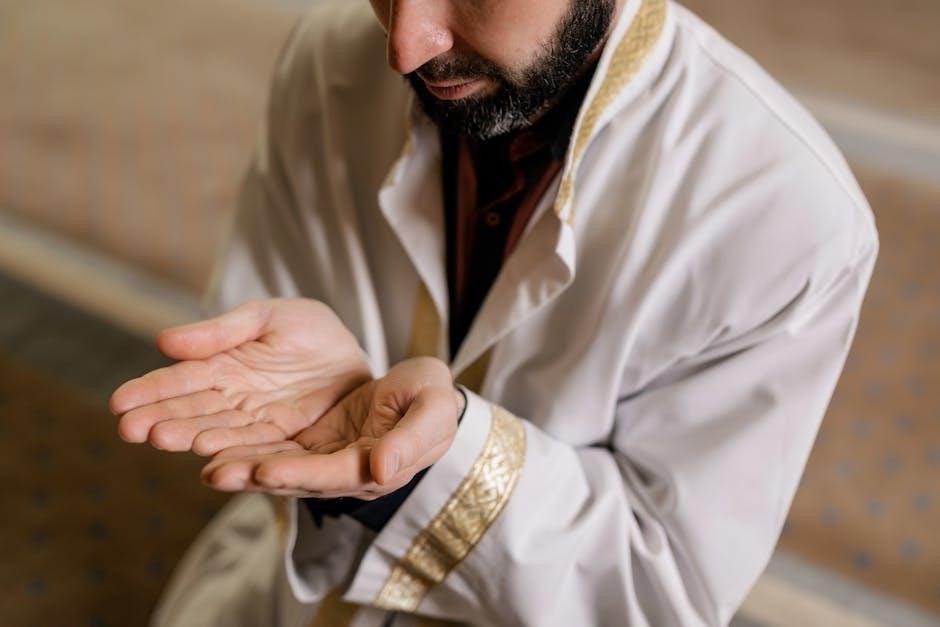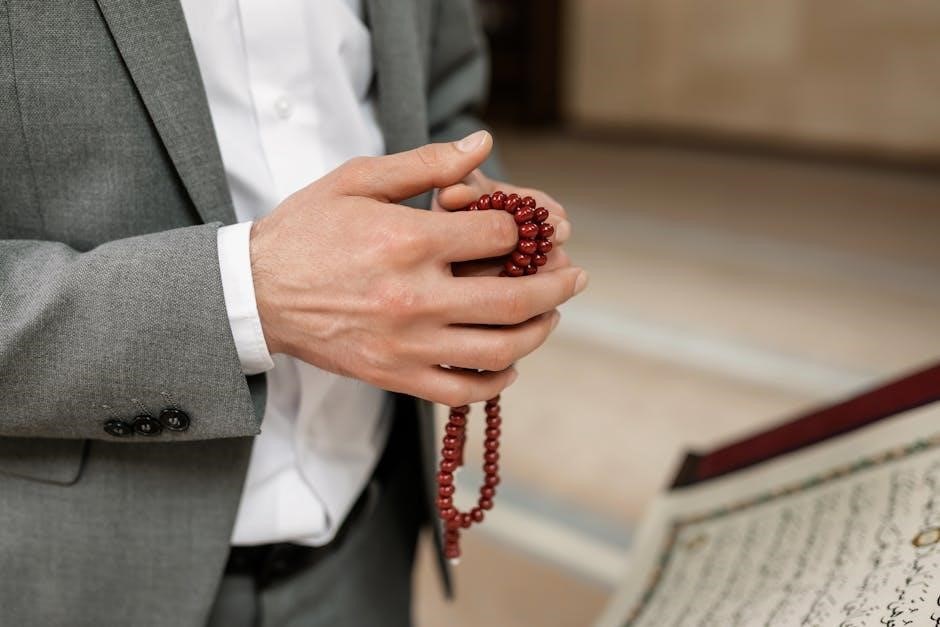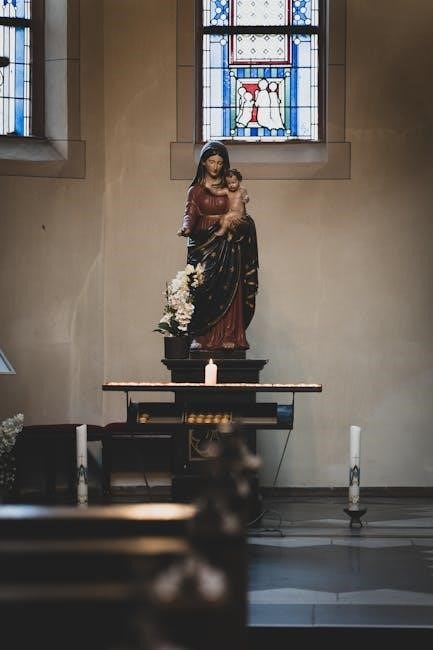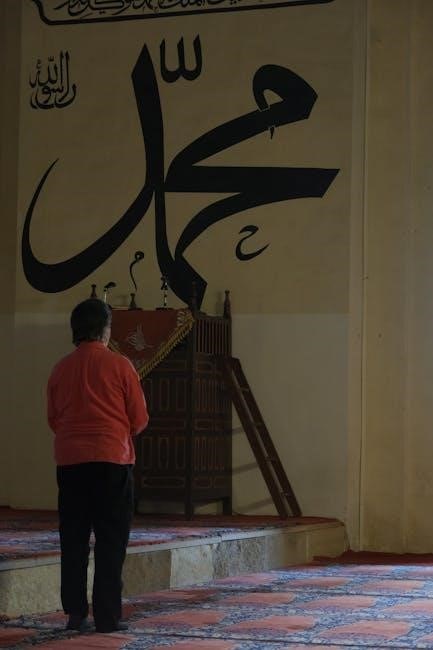Dua after prayer is a deeply rooted Islamic practice, offering a spiritual connection with Allah. Resources like Fortress of the Muslim and Essential Duas provide authentic supplications, available in PDF formats for easy access and recitation after daily prayers.
Importance of Dua After Prayer
Importance of Dua After Prayer
Dua after prayer holds immense significance in Islam, serving as a direct communication with Allah. It is a time of heightened spiritual connection, where the heart is most receptive to divine mercy. Reciting supplications after obligatory prayers strengthens faith, fosters a deeper relationship with Allah, and seeks forgiveness, guidance, and protection. Scholars emphasize that supplicating after Salah is not an innovation but a recommended practice supported by the Prophet’s teachings. Resources like Fortress of the Muslim and Essential Duas provide authentic and structured supplications, making it easier for believers to engage in this virtuous act consistently.
Brief Overview of Dua After Prayer PDF Resources
Dua after prayer PDF resources are widely available, offering a comprehensive collection of supplications for believers. These resources, such as Fortress of the Muslim and Essential Duas in the Life of a Muslim, provide authentic duas with references from credible sources like Sahih Bukhari and Sahih Muslim. They are designed to be print-ready in multiple languages, allowing easy access for individuals worldwide. These PDFs include a variety of supplications for forgiveness, protection, guidance, and sustenance, catering to different prayer times and personal needs. Regular updates ensure the content remains relevant and accessible, making them invaluable tools for enhancing one’s spiritual practice and connecting with Allah through meaningful supplications.

Significance of Reciting Dua After Salah
Reciting dua after salah strengthens spiritual connection, seeking Allah’s mercy, and protection from harm. It enriches faith, fostering a deeper devotion and heartfelt communication with the Almighty.
Spiritual Connection and Heightened State of Devotion
Reciting dua after salah fosters a profound spiritual connection with Allah, elevating the heart to a state of heightened devotion. The moment after prayer is considered sacred, as the soul is softened and more receptive to divine grace. This practice allows believers to deepen their relationship with Allah, expressing gratitude and humility. The Prophet Muhammad (peace be upon him) emphasized the importance of seizing this opportune time for supplication, as Allah is most attentive to His servants. By engaging in heartfelt dua, Muslims can experience a deeper sense of closeness to the Almighty, strengthening their faith and spiritual resilience. This sacred act is further enriched by resources like Fortress of the Muslim, which provides authentic and meaningful supplications in PDF formats, guiding believers in their spiritual journey.
Seeking Forgiveness and Mercy from Allah
Seeking forgiveness and mercy from Allah is a central aspect of dua after prayer. The Prophet Muhammad (peace be upon him) frequently recited Astaghfirullah (I seek forgiveness from Allah) after salah, emphasizing its importance. This practice, deeply rooted in Islamic teachings, allows believers to reflect on their actions and seek divine pardon. Resources like Fortress of the Muslim provide authentic supplications, such as the recommended dua for forgiveness, which are readily available in PDF formats. By sincerely reciting these words, Muslims can humble themselves before Allah, seeking His mercy and grace. This act strengthens one’s relationship with the Almighty and fosters a sense of spiritual purification.
Protection from the Fire and Other Calamities
Seeking protection from the Fire and other calamities is a vital aspect of dua after prayer. The Prophet Muhammad (peace be upon him) encouraged reciting specific supplications, such as the dua for protection from the Fire, which is recommended to be said seven times after Fajr and Maghrib prayers. This practice, supported by hadiths like Sahih Muslim, serves as a shield against divine punishment and worldly afflictions. Resources like the Fortress of the Muslim and Essential Duas provide authentic supplications in PDF formats, guiding believers to seek Allah’s safeguard. Regular recitation fosters a sense of security and trust in Allah’s divine protection.

Recommended Duas After Obligatory Prayers
Key supplications include Astaghfirullah for forgiveness, dua for protection from the Fire, and prayers for guidance, sustenance, and relief. These are detailed in PDF resources like Fortress of the Muslim and Essential Duas, ensuring authenticity and ease of access for believers.
Dua for Forgiveness (Astaghfirullah)
Dua for Forgiveness (Astaghfirullah)
Astaghfirullah, meaning “I seek forgiveness from Allah,” is a powerful supplication recited after prayers. It emphasizes seeking pardon for sins and shortcomings, aligning with the Sunnah of the Prophet Muhammad (peace be upon him). This dua is recommended to be recited thrice after each obligatory prayer, as mentioned in Sahih Muslim. Resources like Fortress of the Muslim and Essential Duas provide this supplication in PDF formats, ensuring its accessibility and proper recitation. Regularly invoking Astaghfirullah fosters humility and strengthens one’s spiritual connection with Allah, seeking His mercy and forgiveness.
Dua for Protection from the Fire

Dua for Protection from the Fire
Seeking protection from the Fire is a central theme in Islamic supplications; The Prophet Muhammad (peace be upon him) recommended reciting a specific dua seven times after Fajr and Maghrib prayers for protection from the Fire. This dua, narrated by Harith ibn Muslim al-Tamimi, emphasizes asking Allah for safeguarding from the torment of the Fire. Resources like Fortress of the Muslim and Essential Duas include this supplication in their PDF formats, ensuring its authenticity and accessibility. Regular recitation of this dua fosters a mindset of seeking Allah’s mercy and protection, aligning with the teachings of the Prophet (peace be upon him). It serves as a reminder of the importance of seeking refuge in Allah from the trials of this life and the Hereafter.
Dua for Guidance and Knowledge
Dua for Guidance and Knowledge
Seeking guidance and knowledge through dua after prayer is a profound practice. The Prophet Muhammad (peace be upon him) emphasized the importance of acquiring beneficial knowledge and implementing it in deeds. Specific supplications, such as asking Allah for “knowledge which is beneficial and sustenance which is pure,” highlight the quest for intellectual and spiritual growth. Resources like Essential Duas in the Life of a Muslim provide authentic supplications in PDF formats, ensuring accessibility. Reciting these duas regularly fosters a mindset of seeking Allah’s blessings for wisdom and understanding, aligning with Islamic values of lifelong learning and righteous action. This practice strengthens one’s connection with Allah and His divine guidance.
Dua for Sustenance and Deeds
Dua for Sustenance and Deeds
Dua for sustenance and deeds is a heartfelt supplication seeking Allah’s provision and acceptance of one’s actions. Muslims are encouraged to recite specific prayers after Salah, such as asking Allah for “knowledge which is beneficial and sustenance which is pure.” This practice reflects the Islamic emphasis on balancing worldly needs with spiritual growth. Authentic resources like Fortress of the Muslim and Essential Duas offer these supplications in PDF formats, ensuring their accessibility. Reciting such duas fosters gratitude and reliance on Allah, while also seeking His approval for one’s efforts and deeds in life. This act strengthens the bond between the individual and Allah, fostering a life of purpose and devotion.
Dua for Relief and Relaxation
Dua for Relief and Relaxation
Dua for relief and relaxation is a supplication seeking Allah’s comfort amidst life’s challenges. It is a prayer for emotional and physical ease, especially during difficult times. Muslims are encouraged to recite specific phrases after Salah, such as “O Allah, I beg You restoration after affliction, relief after grief, relaxation after constriction.” This practice emphasizes trust in Allah’s mercy and providence. Authentic resources like Fortress of the Muslim and Essential Duas provide these supplications in PDF formats, making them easily accessible. Reciting such duas fosters a sense of calm and reliance on Allah, helping believers navigate life’s trials with patience and gratitude. This act strengthens the believer’s relationship with Allah, seeking solace in His infinite compassion and grace.

Duas Specific to Each Prayer Time
Duas specific to each prayer time are recommended, such as Fajr for protection, Zuhr for strength, Asr for family, Maghrib for safety, and Isha for peace. These supplications are available in resources like Fortress of the Muslim and Essential Duas in PDF format.
Fajr Prayer: Dua for Protection and Guidance
The Fajr prayer is a sacred time, and reciting specific duas after it is highly recommended. One such dua seeks protection from the Fire and guidance in daily life. This supplication, often recited seven times, is a Sunnah of the Prophet Muhammad (peace be upon him) and is documented in authentic resources like Fortress of the Muslim. It emphasizes asking Allah for refuge from harm and seeking His mercy. Additionally, the Dua for Protection and Guidance in PDF formats, such as those found in Essential Duas, provides believers with a structured way to maintain this practice. This dua is a powerful means of connecting with Allah during the early hours of the day.
Zuhr Prayer: Dua for Strength and Sustenance
Zuhr, the midday prayer, is a time for seeking Allah’s strength and sustenance. The Prophet Muhammad (peace be upon him) taught a specific dua for this prayer, emphasizing asking Allah for beneficial knowledge, pure sustenance, and deeds that He will accept. This dua, found in resources like Fortress of the Muslim and Essential Duas, is a means to seek divine support during the busiest part of the day. Reciting it after Zuhr helps believers maintain focus and gratitude, while the PDF formats of these supplications ensure easy accessibility for daily practice.
Asr Prayer: Dua for Family and Wealth
Asr prayer, performed in the late afternoon, holds a special significance for seeking blessings for family and wealth. The Prophet Muhammad (peace be upon him) recommended supplicating during this time, as it is a moment of divine acceptance. A recommended dua for Asr includes asking Allah for the well-being of one’s family and an increase in lawful wealth. This supplication, along with others, can be found in authentic collections such as Essential Duas in the Life of a Muslim and Fortress of the Muslim, both available in PDF formats for easy reference and practice.
Maghrib Prayer: Dua for Safety and Blessings
Maghrib prayer, performed at sunset, is a time for seeking safety and divine blessings. The Prophet Muhammad (peace be upon him) emphasized the importance of supplication during this period. A recommended dua after Maghrib includes asking Allah for protection from harm and the granting of blessings in this life and the Hereafter. This supplication, often recited seven times, is also found in authentic collections like Fortress of the Muslim and Essential Duas in the Life of a Muslim, both available in PDF formats for easy access and memorization.
Isha Prayer: Dua for Peace and Security
Isha prayer, performed at night, is a time for seeking peace and security. The Prophet Muhammad (peace be upon him) recommended specific supplications after Isha to seek Allah’s protection and blessings. This dua, found in authentic collections like Fortress of the Muslim and Essential Duas in the Life of a Muslim, is a safeguard against nightly challenges. It includes asking for forgiveness, mercy, and divine protection from harm. Reciting this dua after Isha is a powerful way to seek tranquility and prepare for the night ahead, ensuring a restful and secure state under Allah’s care.

Additional Recitations After Salah
After salah, Muslims often recite Ayatul-Kursi, Surah Al-Ikhlas, Al-Falaq, and An-Nas for protection and blessings. Tasbeeh Fatima (a.s.) is also recommended, enhancing spiritual devotion and seeking Allah’s mercy.
Ayatul-Kursi: The Throne Verse
Ayatul-Kursi, found in the Quran (2:255), is a powerful verse often recited after prayers for protection and blessings. It emphasizes Allah’s dominion and sovereignty, offering solace and security. Regular recitation is recommended in Islamic teachings to ward off evil and harm, fostering a sense of divine protection. Many scholars encourage its recitation after obligatory prayers, as it strengthens faith and provides spiritual comfort. This verse is also included in recommended PDF resources like Fortress of the Muslim, making it easily accessible for daily practice. Ayatul-Kursi is a cherished supplication, deeply rooted in Islamic tradition, and is widely regarded for its profound benefits.
Surah Al-Ikhlas, Al-Falaq, and An-Nas
Surah Al-Ikhlas, Al-Falaq, and An-Nas are three concise yet powerful chapters of the Quran often recited after prayers. They are known as the “Mu’awwidhatayn” (the two seekings of refuge) and are highly recommended for protection from harm and evil. Surah Al-Ikhlas emphasizes the oneness of Allah, while Al-Falaq and An-Nas seek refuge from physical and spiritual dangers. These surahs are included in PDF resources like Fortress of the Muslim, making them accessible for daily recitation. Their recitation after prayers strengthens faith, provides divine protection, and fosters a sense of spiritual well-being. They are a beloved part of Islamic practice, offering comfort and security in daily life.
Tasbeeh Fatima (a.s.)
Tasbeeh Fatima (a.s.) is a recommended practice after obligatory prayers, consisting of specific dhikr (remembrance of Allah). It involves reciting “Subhanallah” 33 times, “Alhamdulillah” 33 times, and “Allahu Akbar” once, followed by a brief dua. This practice, taught by Lady Fatima (a.s;), is highlighted in resources like Fortress of the Muslim and other PDF guides. It is encouraged to strengthen faith, seek blessings, and attain inner peace. Available in multiple languages, these resources make it accessible for all Muslims to incorporate this beautiful tradition into their daily worship, fostering a deeper connection with Allah and enhancing the spiritual benefits of prayer.
Benefits of Reciting Dua After Prayer
Reciting dua after prayer strengthens faith, deepens devotion, and brings inner peace. It also serves as a means to seek blessings, prosperity, and divine mercy, enriching spiritual life.
Strengthening Faith and Devotion
Strengthening Faith and Devotion
Reciting dua after prayer strengthens one’s faith and deepens devotion to Allah. It fosters a sense of humility and gratitude, reinforcing the believer’s spiritual connection. By consistently practicing these supplications, individuals cultivate a stronger commitment to worship and a heightened awareness of Allah’s presence in their lives. Dua after prayer serves as a powerful tool to nurture one’s relationship with the Almighty, fostering steadfastness in faith and promoting a life guided by divine principles. This practice, rooted in Islamic tradition, helps believers seek guidance, express thankfulness, and maintain a heartfelt dialogue with Allah, thereby strengthening their spiritual foundation.
Seeking Blessings and Prosperity
Seeking Blessings and Prosperity
Reciting dua after prayer is a means to seek Allah’s blessings and prosperity in all aspects of life. Through heartfelt supplications, believers request divine favor, guidance, and sustenance. Dua after prayer, as outlined in resources like the Fortress of the Muslim and Essential Duas in PDF formats, provides a structured way to ask for mercy, forgiveness, and success. These supplications help individuals connect with Allah’s generosity, fostering a mindset of gratitude and trust in His provision. By consistently practicing these duascarried out with sincerity, one can attain both worldly and spiritual prosperity, aligning their life with divine will and Islamic values.
Attaining Inner Peace and Satisfaction
Attaining Inner Peace and Satisfaction
Reciting dua after prayer fosters a profound sense of inner peace and satisfaction. It allows believers to seek Allah’s mercy, guidance, and comfort, calming the heart and soul. Through sincere supplications, individuals connect with Allah, finding solace in His divine presence. Resources like the Fortress of the Muslim and Essential Duas PDF provide structured duascarried out with sincerity, helping believers cultivate a deeper spiritual state. Consistently practicing these duascarried out with sincerity nurtures a heart at rest, enabling one to face life’s challenges with patience and reliance on Allah, ultimately achieving a satisfied and tranquil soul.
Preparing for the Hereafter
Reciting dua after prayer is a vital practice for preparing for the Hereafter. It strengthens one’s focus on the eternal life, seeking Allah’s mercy and forgiveness. Dua helps believers strive for righteous deeds, ensuring their actions align with divine will. By regularly supplicating, individuals cultivate a mindset of accountability, fearing Allah’s judgment and seeking refuge from the Fire. Resources like the Fortress of the Muslim and Essential Duas PDF provide guidance, emphasizing the importance of sincere supplications. Such practices not only enhance spiritual readiness but also encourage a lifelong commitment to pleasing Allah, ultimately aiming for Paradise and eternal bliss.

How to Perform Dua After Prayer
Perform dua after prayer with sincerity, facing the Kaaba, and using authentic supplications from resources like Fortress of the Muslim or Dua After Prayer PDF guides.
Proper Method of Reciting Dua
Proper Method of Reciting Dua
The proper method of reciting dua after prayer involves facing the Kaaba, ensuring sincerity, and using authentic supplications. Begin by performing the obligatory prayer with focus, then remain seated calmly. Recite the recommended duas, such as Astaghfirullah (seeking forgiveness) and Tasbeeh Fatima, using resources like Fortress of the Muslim or Dua After Prayer PDF for guidance. Maintain humility and concentration, avoiding distractions. Use a moderate voice, and if in congregation, avoid loud recitation to respect others. Conclude with heartfelt, personal supplications, seeking Allah’s mercy and blessings. This method ensures a meaningful and spiritually enriching experience.
Importance of Sincerity and Focus
Importance of Sincerity and Focus
Sincerity and focus are paramount when reciting dua after prayer. Ensure your intention is pure, seeking only Allah’s pleasure. Face the Kaaba, maintain a calm demeanor, and avoid distractions. Recite recommended duas, such as Astaghfirullah and Tasbeeh Fatima, using authentic resources like Fortress of the Muslim or Dua After Prayer PDF. Concentrate on the meanings, allowing your heart to connect with Allah. Avoid worldly thoughts and maintain humility. This focus enhances the spiritual experience, ensuring your supplication is heartfelt and impactful. Remember, Allah accepts duas that are sincere and performed with devotion.
Role of Tasbeeh in Dua
Role of Tasbeeh in Dua
Tasbeeh plays a vital role in dua after prayer, serving as a means to glorify Allah and create a spiritual atmosphere. Reciting Tasbeeh, such as the Tasbeeh of Fatima (a.s.), is highly recommended and acts as a Sunnah practice. It helps in focusing the mind, expressing gratitude, and seeking forgiveness. Imam Mohammed Baqir (a.s.) emphasized its importance after obligatory prayers. Using authentic resources like Fortress of the Muslim or Dua After Prayer PDF, one can incorporate Tasbeeh into their supplications, ensuring a deeper connection with Allah. This practice not only enhances the quality of dua but also aligns one with the teachings of the Prophet (peace be upon him) and his family.

PDF Resources for Dua After Prayer
Discover authentic Dua After Prayer PDF resources like Fortress of the Muslim and Essential Duas, offering supplications in multiple languages for easy practice and reference after daily prayers.
Fortress of the Muslim by Darussalaam
Fortress of the Muslim by Darussalaam
Fortress of the Muslim by Darussalaam is a renowned resource for authentic Islamic supplications. It provides a comprehensive collection of duas and adhkar (remembrances) for various occasions, including after prayer supplications. Available in PDF format, it features Arabic texts with English translations, making it accessible to a global audience. The resource is widely trusted due to its meticulous compilation from reliable sources like Sahih Bukhari and Sahih Muslim. Print-ready versions are offered in multiple languages, allowing users to easily print and distribute them. Regular updates ensure the content stays relevant and aligned with Islamic teachings. This resource is invaluable for Muslims seeking to enrich their spiritual practice with authentic and heartfelt supplications after daily prayers.
Essential Duas in the Life of a Muslim
Essential Duas in the Life of a Muslim is a valuable resource for believers seeking to deepen their spiritual practice. This PDF compilation includes authentic supplications for various life situations, with a focus on duas after prayer. It features Arabic texts, English translations, and references from trusted sources like Sahih Bukhari and Sahih Muslim. The document emphasizes key supplications such as the Dua for Forgiveness and the Dua for Protection from the Fire, which are recommended after daily prayers. Available in multiple languages, it is easily accessible and printable, making it a practical guide for Muslims worldwide to incorporate these blessed supplications into their daily routines and strengthen their connection with Allah;
Print-Ready Files in Multiple Languages
Print-ready PDF files of duas after prayer are now accessible in multiple languages, catering to a diverse Muslim community. These files, designed for easy printing, allow believers to create high-quality copies for personal use or distribution. Available in vector format, they maintain clarity even when enlarged, making them suitable for both home printers and commercial printing services. Regular updates ensure the content remains relevant and accurate. This initiative promotes the spread of authentic supplications, enabling Muslims worldwide to benefit from these spiritual resources and incorporate them into their daily worship routines seamlessly.
Incorporating dua after prayer enriches spiritual life. Utilize authentic PDF resources for guidance, fostering a deeper connection with Allah and enhancing devotion in daily worship routines.
Encouragement to Practice Dua After Prayer
Embrace the habit of reciting dua after prayer, a Sunnah of the Prophet (peace be upon him), to strengthen faith and connection with Allah. Authentic PDF resources like Fortress of the Muslim and Essential Duas provide guidance, ensuring correct recitation. These resources, available in multiple languages, simplify learning and practice. Consistency in dua fosters sincerity and devotion, while seeking forgiveness, protection, and guidance aligns one’s heart with divine will. Make dua a priority to seek Allah’s mercy and blessings, enhancing spiritual growth and preparing for the Hereafter. Let these supplications become a cherished part of your daily worship routine.
Final Words on the Importance of Dua
Dua after prayer is a timeless spiritual practice, deeply ingrained in Islamic tradition. It serves as a direct link to Allah, fostering humility, gratitude, and devotion. Authentic PDF resources like Fortress of the Muslim and Essential Duas provide reliable guidance, ensuring supplications align with Sunnah. Consistency in reciting dua strengthens faith, seeks mercy, and prepares for the Hereafter. Embrace this sacred habit to cultivate inner peace, seek blessings, and draw closer to Allah. Let every dua be a heartfelt conversation, reflecting sincerity and reliance on His divine will. May your supplications be accepted and your connection with Allah grow stronger.
